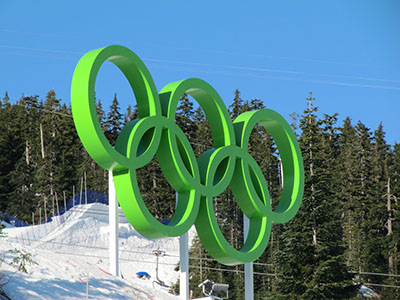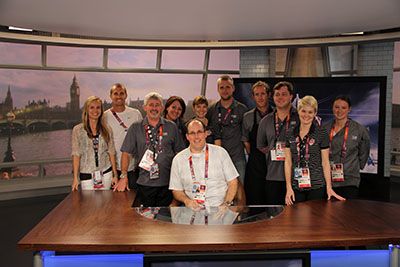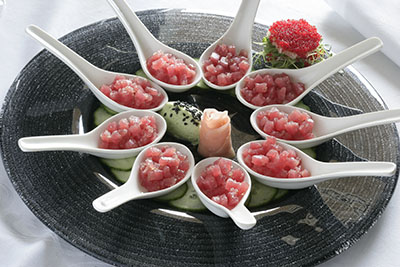Catering an event like the Olympics can be a tough sport. Here’s how to win.
By Eve Daniels, Editor, Catersource magazine
 The first-ever Winter Olympics took place in 1924, in a small resort town in France. The event drew some 10,000 spectators in person, in total. Back then, a global TV broadcast and live internet stream were the stuff of science fiction.
The first-ever Winter Olympics took place in 1924, in a small resort town in France. The event drew some 10,000 spectators in person, in total. Back then, a global TV broadcast and live internet stream were the stuff of science fiction.
Fast-forward to 2014, and the 22nd Winter Olympics in Sochi, Russia, is expected to reach billions of viewers worldwide. For U.S. viewers, NBC will offer primetime coverage of nearly 100 different events this February. That means a lot of hard-working commentators, producers and technicians setting up shop in Olympic Park.
That also means a lot of mouths to feed.
“Imagine taking 5,000 people camping for two solid months, serving 12,000 meals a day,” says John Crisafulli, president of Behind the Scenes (BTS) Catering. With NBC as a longtime client, the San Diego-based catering company will provide all food for the U.S. broadcast and international media partners, as well as the top corporate sponsors and many athletes.
How, exactly, does an independent catering company like BTS pull off an event of such epic proportions? Crisafulli shares his know-how.

Embrace your independence
Behind the Scenes Catering has been working with NBC since the 1995 America’s Cup in San Diego, CA. Winning that contract involved some chasing, but ultimately, the company’s smaller size and tailor-made services were key to closing the sale.
With about 100 part-time and full-time employees, BTS offers a level of personalized customer service and flexibility that global foodservice companies can’t afford.
“Initially, NBC’s mindset was to have one large, multinational company take on the Olympics, and that’s just not us,” says Crisafulli. “But because we’re nimble in making our services fit within the client’s budget, it ended up working very well.” Indeed it did, as this will be the eighth Olympic Games for BTS.
Be a partner vs. a vendor
In a nutshell, the standard client/vendor relationship goes something like this: They tell you what they want, you provide the service, they pay you, end of transaction. While that model may work for some caterers, it’s not the way BTS operates.
“We’ve continued to build relationships over the years by considering ourselves a business partner with our clients. Part of that is the way we structure our contracts. We do a lot of contracts on a fixed management fee basis, especially with larger events.”
Instead of charging per head, BTS often determines a budget based on needs and charges a flat rate. Crisafulli says this strategy removes the gaming (no pun intended) from normal contracts.
“Because we’re working on a cost basis with open book accounting, there’s a complete level of trust. Yes, it’s less money than you would usually make margin-wise if you were doing per person, but it’s also a fixed amount that you’re guaranteed to make. So it takes the risk out of the relationship for both sides.”

Make health a high priority
Frequent business travel in your own country, much less across the globe, can do a real number on your health. And good health is essential to providing good service. On that, Crisafulli has some simple yet solid advice: “Sleep whenever you can, including on planes.”
He’s also an advocate of healthy eating and an overall healthy lifestyle. This philosophy makes sense in more ways than one, given how many athletic events BTS has catered, from the Super Bowl to the X Games and, of course, the Olympics.
“We’re always looking for ways to keep the crew and clients healthy so they can do their jobs. We try to provide good choices in fresh and whole foods to keep energy levels up and make sure everyone looks good on TV.”
Located in the Krasnodar Krai territory, Sochi is a developing city with limited resources and unlimited political issues. To say the logistics are tricky is a bit of an understatement.

Prepare yourself for politics
“Typically we try to source as much as we can in-country, but in this games we weren’t able to guarantee the safety of our supply chain,” says Crisafulli, adding that the 2014 games will go on record as the most challenging one yet.
In response, BTS has to ship in their food and equipment from the U.S. and neighboring countries. This involves all the complexities of moving 50 to 60 containers of product from one country into another.
This year, most of the produce will come through vendors in Italy, France, Spain and the Netherlands. Four days a week, the trucks drive 26 hours between Moscow and Sochi. Along with an offsite storage facility outside of Olympic Park, BTS has its own cold storage logistics trucks. “We control the entire supply chain from start to finish, so we become our own Sysco, in a sense.”
Speaking of Sysco, BTS is working with them to develop a system for shipping products and cross-stocking items they don’t normally stock. They’re also working with a German logistics company to sort out the piles of paperwork.
 On top of all this, there’s the powers-that-be. One example:
On top of all this, there’s the powers-that-be. One example:
“We had to move products from San Diego to L.A. to get the USDA inspections in the middle of the government shutdown, so that put us behind a week or two. When that was over, the USDA wasn’t certifying any cargo going to Russia, which had to do with some payback from Russia’s ban. So politics sometimes plays a role and, like it or not, we have to figure out ways to work around that.”
Despite the food-related challenges, the majority of guests won’t see the same menu more than three times. From a 15-day rotating core menu, Crisafulli encourages his chefs to get creative, to switch around the proteins and to use anything in the pantry. They also move the chefs around at the venues.
Keep things interesting
“If you ate in the same restaurant for 60 days straight, you’d get bored. So we do a lot to keep the menu exciting and different.”
In addition to a core group of chefs from San Diego, BTS brings in contract staff from Australia, Europe and other regions of the U.S. and the world. “It’s not just Americans feeding Americans. We’re as diverse in our staff as you would imagine in an Olympic Games.”
BTS is working at 10 different venues during the games, where they have commercial kitchens set up in a temporary structure. Because they’re shipping in products from the U.S., they’ll have some new gluten-free options this year to compliment their normal offering.
As for the overall presentation, BTS will strive for innovation in everything from regular meals to high-profile cocktail receptions.
“Our smallest venue is maybe 120 people and our largest venue is up to 1,800. You can do a lot with both. Some of our chefs will do sous-vide; others will dehydrate certain products. We give the chefs tools they can play with.”
When Crisafulli started out in the catering business, the plan was to do it for a couple of years and then move on.
“That was 23 years ago,” he laughs, “and I still love it every day. I love being able to travel around the world and bring our employees along, and to bring those experiences back to the work we do in the U.S.”
An avid snow skier, Crisafulli will do his best to take a break in Sochi and watch the ski competitions. The rest of the time, he and his staff will do their best to provide service worthy of the gold.
This article first appeared in Catersource magazine, January 2014 issue. Learn more and register for the 2014 Catersource Conference & Tradeshow at www.catersource.com.
About Catersource:
Catersource and Event Solutions, the leaders in catering and event industry news and education, are proud to bring you the 2014 Catersource and Event Solutions Conference & Tradeshow, held annually in Las Vegas. Join caterers, chefs, event planners, designers, marketers and suppliers in an environment built for learning, sharing and experiencing all the industry has to offer! To learn more please visit www.catersource.com and also find them on Facebook, Google+, and Twitter.









